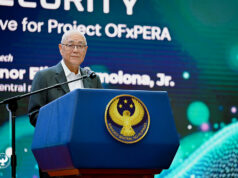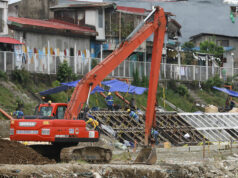Miners hope to close book on Lopez era
MINERS said they expect to move the industry forward after the disruptive term of the Duterte administration’s first environment secretary, with an industry conference due this week.

The three-day conference will be held at the Sofitel Philippine Plaza Manila in Pasay City from Sept. 5-7, and will be called “Responsible Mining: Moving Beyond Compliance.”
“This is really responding to what’s happened in the last 12 months,” Chamber of Mines of the Philippines Executive Director Ronald S. Recidoro said in a phone interview last week.
“The industry has been at the center of a policy storm when (President Rodrigo R.) Duterte came out with his statements early on and he appointed former Environment Secretary Regina Paz L. Lopez. Our world really turned upside down,” he added.
The appointment of Ms. Lopez, a staunch environmentalist and known opponent of mining, produced a campaign against irresponsible miners, especially large-scale companies whose financial resources she hoped to tap to rehabilitate mines and develop green communities.
After thrice being bypassed at the Commission on Appointments since her appointment in June 2016, Ms. Lopez was finally rejected in May.
“After Gina was rejected, it cannot be just business as usual… Now, in redefining responsible mining, we want to take it a step higher and move beyond compliance,” Mr. Recidoro said, noting that miners are encouraged to participate in enhancing communities’ environmental and social development programs.
Global Ferronickel Holdings, Inc. President Dante R. Bravo expressed hopes that the mining conference succeeds in reversing the misinformation allegedly spread by Ms. Lopez.
“We hope the discussions would hinge on the position of the industry on the pending bills in Congress affecting mining, the required actions on the pending cases left by Gina Lopez and the activities needed to be done to correct the public perception about the industry,” said Mr. Bravo in a mobile message.
Jose Bayani D. Baylon, vice-president of Nickel Asia Corp.’s corporate communications division, said the government also plays an essential part in exploring the opportunities presented by extractive industries, both in the social and the economic aspects.
“[It is] important I think to engage our policy makers to help them understand the role of sustainable mining in a vibrant economy,” Mr. Baylon said in a text message.
“[Target] result is awareness of the stakeholder on the existing good governance policy of the government and for them to be compliant of the existing laws, rules and regulations,” Mines and Geosciences Bureau (MGB) Assistant Director Danilo U. Uykieng, one of the invited panelists, said in a text when sought for comment.
The industry has been reeling from unfriendly policies since the previous government decided to halt approvals for new mining projects in 2011 and extended indefinitely through Executive Order No. 79 signed by former President Benigno S. C. Aquino III on July 6, 2012.
In 2012, the value of the country’s metal output fell by about a fifth to P100.798 billion following the suspension of key mining projects.
The decline halted the trend of growth seen since 2008, data from the Philippine Statistics Authority show.
Declines continued until last year when metals production hit P75.93 billion but a rebound is expected this year due to higher metal prices.
The value of metals output in the six months to June totaled P50.81 billion, up 4.27% from a year earlier.
Data from the MGB show mining contributing 0.6-0.7% annually to gross domestic product from 2013 to last year, with the share coming in at 0.7% in the second quarter of 2016, as well as 0.5-0.7% of total employment.
The country’s land area is about 30 million hectares, nine million hectares of which the MGB identifies as having high potential for mineral extraction.
Only 3% of the Philippines is officially a mining area and only 0.3% of this is actively mined. — Janina C. Lim



